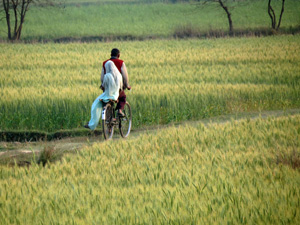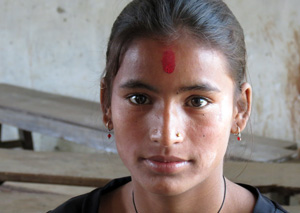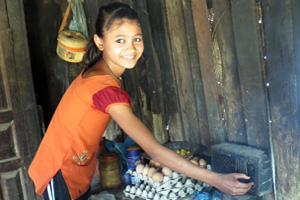
Nepali people do not need a visa to India and can enter India via rural border crossings like this one. Sometimes a male trafficker may pretend that the girl he is taking into India is his wife, so that border guards do not question the couple.
Credits: Laura Sheahen/Caritas
By Laura Sheahen “When I was 13, my father sold me to a man.” Harimaya, now 16, is sitting on the side of a dirt road in western Nepal, making sure her schoolmates nearby can’t hear her. “My father has HIV. The man he sold me to was also infected with HIV.”
Dust blows by and Harimaya pulls her scarf around her head more tightly as she speaks. “I had to live with him, and cook and clean for him,” she goes on. “But I didn’t want to. One day, I ran away.”
This village is one of thousands in Nepal, a deeply impoverished country northeast of India. It looks sleepy enough; cows and goats chew their feed and farmers lug the vegetables they’ve gathered. But within a half-kilometre radius, in just one afternoon, a walk down this village road shows Nepal’s dangers. In poverty-stricken rural areas, people young and old are sold all the time.
Hovering in the distance is a teenage girl named Puja, who brought Harimaya here on her hot-pink bicycle. A few weeks ago, Puja and another friend met a man who urged them to cross the Nepal-India border with him—it’s a half-hour away.
Down the dirt road about 200 steps is a 21-year-old man who’s returned from Malaysia, where he made furniture for months without being paid. He’s still trying to repay the money he borrowed for the employment agent who got him the job.
Especially near the open border with India, Nepali villagers are sought after by “agents”—people who promise them good jobs far away. Others, particularly teenage girls, are approached by “family friends” who offer them an exciting trip to India.
Harimaya wasn’t sold far. Before her escape, she remained in Nepal with the man she was sold to; perhaps he believed the prevalent myth that if you have sex with a virgin, your HIV will be cured. The man who encouraged Puja and her friend to cross the border might have planned to sell them into an Indian brothel, or into a private home in India as unpaid housemaids. Rabindra, the young man who made furniture, went the farthest. Before going, he had to raise 2000 euros to pay the agent who sent him to Malaysia.

Sushila, a teenage girl in western Nepal, has a minor physical disability and is not treated well by her stepmother. Caritas pays her school fees so that her family will keep her in school. Girls who drop out are more vulnerable to sex traffickers.
Credit: Laura Sheahen/Caritas
“They handed me a boarding pass right before the airplane took off and said, ‘Sign this contract,’” remembers Rabindra. “It was for another company, not the one we were told.” He spent ten months making furniture, but the agency never paid. “The work was hard. And the Chinese people there beat us with a stick because we didn’t work as fast as they did.”
Rabindra is educated. As he sits in a roadside shack where tea is sold, he helps a little boy with his homework. Rabindra knows he was badly cheated, and feels ashamed about it. But he’s also angry with the agent, whom he couldn’t take to court because of the last-minute contract he signed.
People in Bardiya, this region of Nepal, know a little bit about human trafficking: the crime of buying and selling human beings. But they don’t know what tricks traffickers might play, and they’re so desperate to leave their dead-end villages that they take chances.
The woman making the tea in the shack is one example of why people want to leave: the lack of jobs and a future brings out the worst in people. “My husband beat me and poured boiling water on me,” she says. He fled to India; with her clothes sticking to her wounds, she got on a bus to seek out medical treatment. “The burns on her body were really bad,” nods one man at the tea shop. A few minutes later, a young mother named Rina happens to stop by the cafe. Caritas staffers are working on her case: after numerous threats, her husband strangled her with her scarf and left her for dead. Rina has photos showing the deep marks the scarf left on her throat; as she lay unconscious, the police only knew she was alive when her fingers moved.
Down the road is another example of why people want to leave. Children squat near mounds of mud mixed with straw, slapping globs of the mixture into rectangular moulds. They’ll earn about 1.50 euros a day making bricks, breathing in a harsh dust that scratches throats and eyelids and doesn’t blink out.
The hopelessness of the villages makes people willing to try almost anything. But however grim a girl’s life in a village is, it’s better than life as a housemaid-slave, or years of forced prostitution. So when girls disappear, charities try to find them fast.
In some cases, Caritas social workers literally chase people down. When Puja and her friend Ranjula didn’t come home, Ranjula’s mother contacted a Caritas partner. The staff there joined Ranjula’s family, using the trafficker’s cryptic cell phone messages to triangulate the two girls’ location. “I was relieved when Manju and Som helped us,” says Ranjula’s mother, referring to the Caritas partners. “We suspected he might sell our daughter into India. I’m not sure I would have found my daughter without them.” Discovering the two girls at a bus stop on a rural road, the family and the Caritas partners ran after them into nearby woods, and brought them home.

Thirteen-year-old Sweta is an orphan being raised by relatives. Caritas Nepal pays for her to go to school. When she and her school friends listen to the radio, they hear a Caritas radio “jingle” warning them about trafficking.
Credit: Laura Sheahen/Caritas
Caritas tries to offer at-risk people other options, giving small loans to poor women. Lakshmi, the burn victim who runs the tea shop using a loan, is one of them—she can feed her children because of the shop. On a macro level, Caritas Internationalis is calling for better laws to protect vulnerable people from human trafficking and from migration scams—and calling for better enforcement of those laws.
Back in the village, Caritas also pays school fees for teenagers who might drop out or accept dubious job offers. A few hundred steps from the tea shop, Sonam and Sweta are both 13-year-old girls without fathers. Sonam’s mother has HIV and both Sweta’s parents are gone. “She wouldn’t be trafficked into a brothel—she’s not the right type,” says a Caritas staffer about Sonam: skin colour matters to brothel clients, and if you’re too dark, you’re not what the market wants. “But they might be trafficked as a housemaids.”
Caritas is keeping both girls in school. Caritas is doing the same for Harimaya, who now lives with other relatives and not the father who sold her. Caritas runs radio shows on the station Sonam and Sweta listen to, warning them about accepting offers from strange men.
But in a place where your own family members or neighbours will sell you, the battle against trafficking and exploitation never has a finale. Within a few steps of the tea shop, a girl’s been sold and a boy tricked into servitude. Two women almost died from abuse. Two other girls were nearly trapped.
The villagers who were cheated and injured have a few things in their favour: they escaped. Many don’t. All of them know, for sure, what dangers are out there. Many don’t. And all of them have a second chance to use their freedom, circumscribed as it is, to make a better life. Harimaya remembers her feelings when she got in a rickshaw to flee the HIV-positive man who was using her. “I was really scared, but I also felt happy,” she says. “I felt I was free.”
